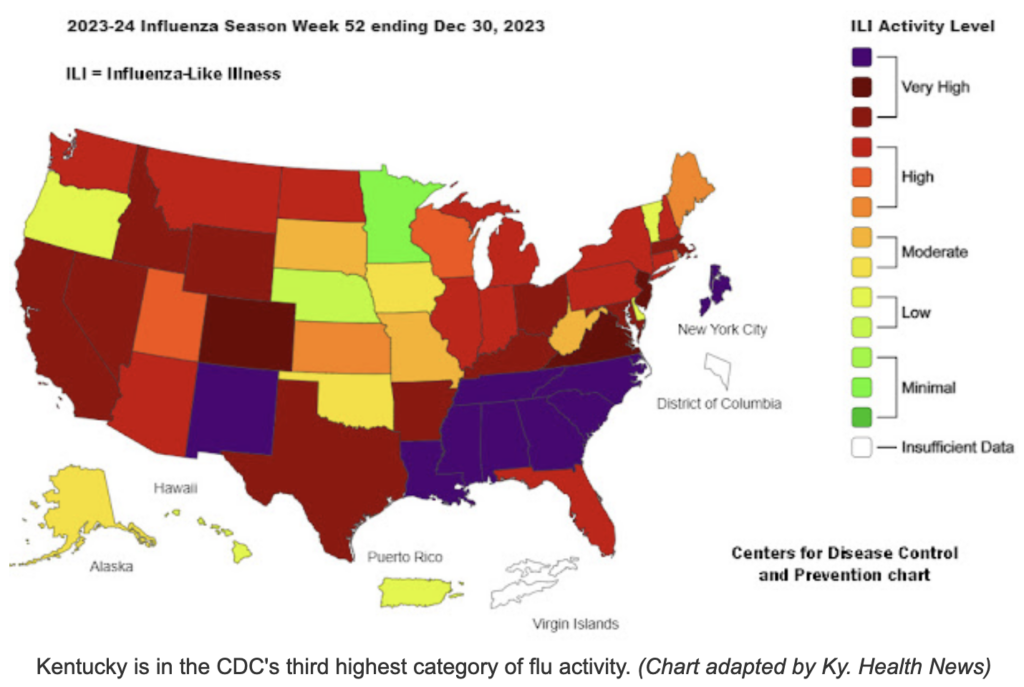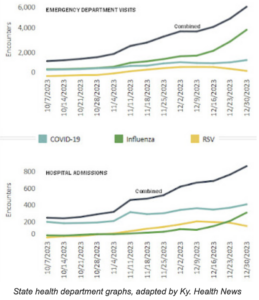Flu, up 33% in year’s final week, continues to drive big jumps in respiratory illness in Kentucky; it’s not too late to get a flu shot

By Melissa Patrick
Kentucky Health News
“The influenza virus is the thing that’s really skyrocketing right now,” Dr. Steven Stack, Kentucky public-health commissioner and president of the Association of State and Territorial Health Officials, told NPR. “Influenza is sharply escalating and driving more hospitalizations.”
 The state’s weekly report for the week ended Dec. 30 shows that the three respiratory that it tracks – flu, Covid-19 and respiratory syncytial virus – accounted for 5,662 vistis to Kentucky hospital emergency departments. That was an increase of 20% from the prior week, when the state recorded 4,703 such visits.
The state’s weekly report for the week ended Dec. 30 shows that the three respiratory that it tracks – flu, Covid-19 and respiratory syncytial virus – accounted for 5,662 vistis to Kentucky hospital emergency departments. That was an increase of 20% from the prior week, when the state recorded 4,703 such visits.
For the third week in a row, flu cases accounted for a majority of the respiratory-illness cases seen by emergency departments. The latest report shows 3,802 of the visits were for flu, up from 2,854 in the prior week.
Covid-19 cases increased 15% during the week, to 1,365, up from 1,183 the prior week. RSV cases dropped 25.6%, to 495 from 666 the prior week.
Kentucky children four and younger saw an 8% increase in respiratory-related emergency-department visits, increasing to 1,378 from 1,271 the prior week. This increase was also driven by a 32% increase in flu cases, to 854, up from 646 the prior week.
RSV cases among children under four dropped to 328 during the week, down from 453 the week prior, and 196 of the cases were for Covid-19, up from 172 the week prior.
Kentucky children between the ages of 5 and 17 saw a slight drop in emergency department visits for respiratory illness, down to 928 from 994 the prior week. Of those, 823 were for flu, down slightly from 861 the week prior; 75 for Covid-19, down from 77 the week prior; and 30 for RSV, down from 56 the week prior.
The state considers all of these respiratory viruses to be at an elevated level, with hospitalizations for the flu increasing.
Hospitalizations for respiratory illness increased to 857, up from 757 the week prior, an increase of 13%. Of those 404 were for Covid-19, up from 364 the week prior, an increase of nearly 11%; 306 were for flu, up from 207 the week prior, an increase of 47.8%; and 147 were for RSV, down from 186 the week prior, a decrease of nearly 21%.
Among children four an younger, there were 122 hospitalizations related to respiratory illness, down slightly from 125 the week prior. Of those, 76 were for RSV, down from 97 the week prior; 28 were for flu, up from 16 the week prior, an increase of 75%; and 18 were for Covid-19, up from 12 the week prior.
Among children 5-17, hospitalizations for respiratory illness dropped to 16, down from 25 the week prior. Of those, 13 were for flu, down from 19 the week prior; two were for RSV, down from five the week prior; and one was for Covid-19, the same as the week prior.
According to the CDC, 20 Kentucky counties had a high rate of Covid-19 hospitalizations in the week ended Dec. 30, with most of them in the far eastern and western parts of the state. Since last week’s report, Clinton and Cumberland counites were added to this list.
The CDC considers 20 or more hospitalizations per 100,000 people a high rate.
Those counties were led by Pike, at 37.1 hospitalizations per 100,000 people; McCracken (23.6); Martin (20.2); Marshall (23.6); Magoffin (21.4); Lyon (23.6); Livingston (23.6); Lawrence (20.2); Johnson (21.4); Hickman (23.6); Greenup (20.2); Graves (23.6); Floyd (21.4); Cumberland (23.8); Crittenden (23.6); Clinton (23.8); Carter (20.2); Carlisle (23.6); Boyd (20.2); and Ballard (23.6).
Since Oct. 7, Kentucky health officials have attributed 159 deaths to Covid-19, an average of about 12 per week. There have been seven flu-related deaths.
Doctors say the best way to prevent hospitalization for Covid-19, the flu and RSV is immunization. Vaccines are readily available for the flu and Covid-19. The RSV vaccines for infants and people over 60 are in shorter supply, so experts advise you to check with your doctor or nurse practitioner.
Stack “encourages seasonal preventive shots for everyone 6 months and older,” NPR reports, but “says it’s particularly important for ‘everybody who is elderly — and not even old elderly — like young elderly, 60 and older,’ since they are more likely to get very sick from these viruses.”